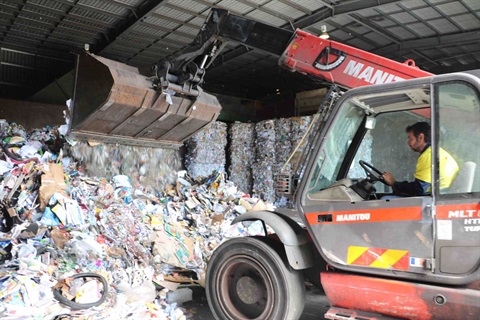Tweed residents encouraged to keep recycling
23 March 2018

Council supports innovation and investment in response to industry changes
In light of policy decisions overseas which are affecting the recycling industry worldwide Tweed Shire residents are being asked to take extra care with what they put in their yellow lid bins.
A recent policy change in China has created much tighter restrictions on recyclable materials from our yellow lid bins that are sent to processing.
China is now requiring that contamination rates for plastics, paper and cardboard products are below 0.5 per cent, with most Materials Recovery Facilities (MRFs) worldwide being unable to achieve this very low level.
Contamination rates for Tweed Shire have in recent years been steady at 5 per cent, during a time when the standard set by China has been 10 per cent.
The Chinese Government has indicated the measures are being introduced to focus on their own recycling processing, to improve the quality of imports and ultimately to improve their environmental management, particularly regarding air pollution.
Tweed Shire Council Director Community and Natural Resources Tracey Stinson said most material going into yellow lid bins in Tweed Shire is still being recycled at primary and secondary processing facilities.
“Recyclables collected from the yellow bin every fortnight will continue to be collected by Council’s contractor and managed by the privately run MRF in Chinderah, which is still finding markets both locally and overseas to reuse this material,” Ms Stinson said.
“We are working with our neighbouring Councils in the Northern Rivers that are also going through these short term changes, while looking to State and Federal Governments to drive innovation and investment in technology to develop new processing facilities and markets for recycled products in Australia in the long term.
“This is an international issue with much of the world’s recycling being sent to China for processing, a market they created to get access to raw materials which could be turned into manufactured goods.”
Council has initiated discussions with neighbouring Councils through North East Waste to best consider what future collaborative options might be available to address the issue.
“We are also currently reviewing Council’s own environmental design guidelines for buildings and facilities with a view to increasing the percentage of recycled materials in things like traffic bollards, park furnishings and road construction materials,” Ms Stinson said.
Council is asking residents to do their part by following household recycling requirements closely – rinsing items before they go into the bin, removing lids from containers and bottles, ensuring only recyclable material is placed in the bin and avoiding single use containers and products wherever possible.
“The decision by China sheds light on the bigger issue here which is that waste is all of our responsibility, on a local and national level, where avoidance of waste in the first place is the best solution,” Ms Stinson said.
“We need to think about the purchases we make and if it cannot be avoided think about purchasing recycled products or products that have recycled packaging.”
Tweed Shire Council offers free drop off of recyclable items at Stotts Creek Resource Recovery Centre such as aluminium, steel, glass, hard plastic, paper and large cardboard as well as problem household waste items such as gas bottles, batteries and paint.
Other larger recyclable items such as TVs, fridges, washing machines and dryers can also be dropped off for free.
For a full list of items please visit our additional recycling options on www.tweed.nsw.gov.au/WasteDisposal and for more information contact the Waste Unit, on 6670 2700.
Downloads
Photo 1(JPG, 168KB)
Caption: Material from yellow lid bins being processed at the Chinderah material recovery facility